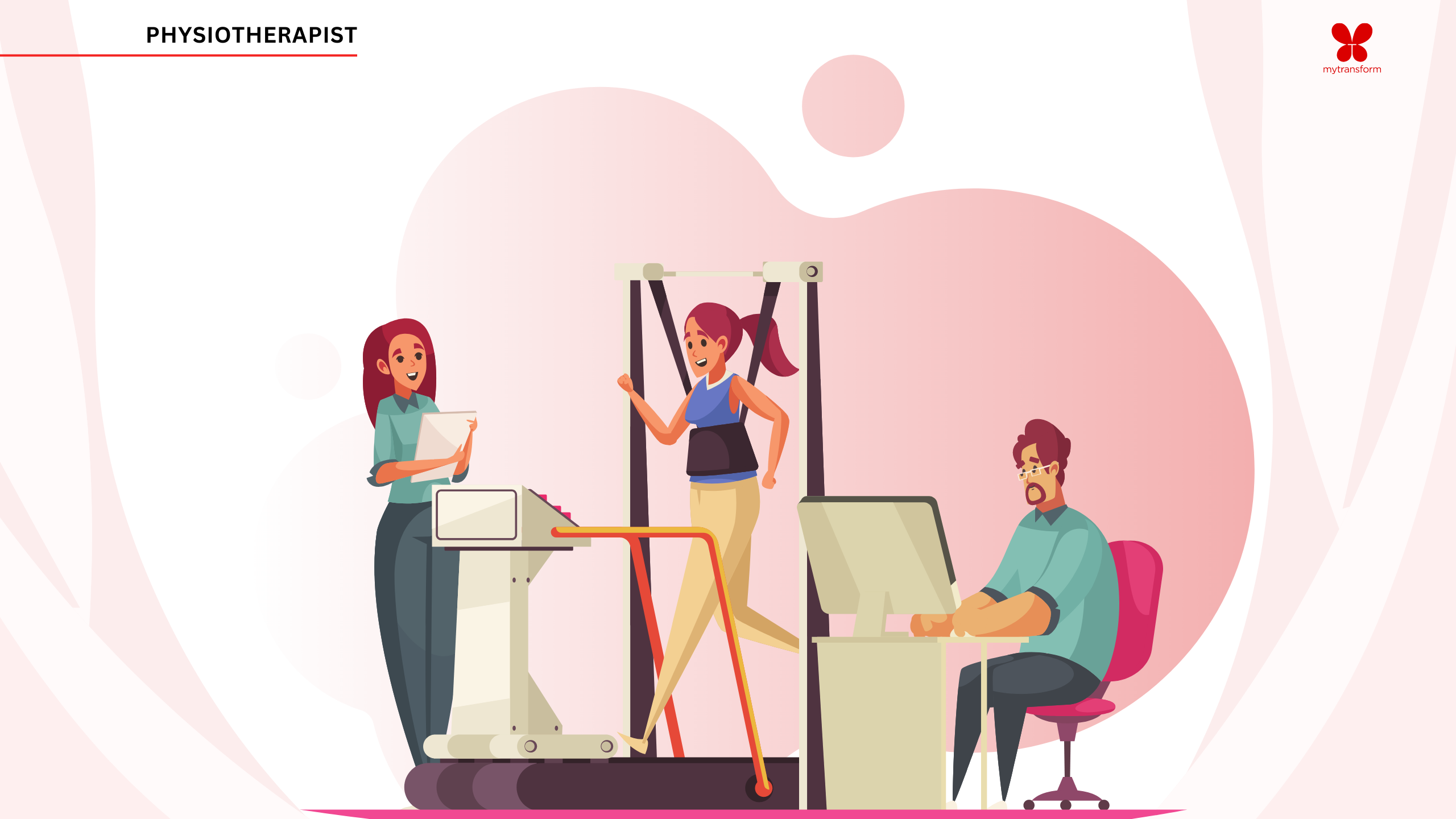
Being a physiotherapist in India involves helping people improve their physical function and manage pain.
You will work with a wide range of patients and conditions and use a variety of techniques to develop personalized treatment plans.
To become a physiotherapist in India, you will need to complete a BPT degree program and obtain a license to practice.
There are many career opportunities in India for physiotherapists. If you are wondering ‘How to become a Physiotherapist in India?’ or ‘How to become a Sports Physiotherapist?’ this article will provide all the details on a physiotherapy career, physiotherapist qualifications, physiotherapist salary in India, etc.
Who Is A Physiotherapist?
A physiotherapist is a healthcare professional who specializes in the treatment of injuries, disorders, and conditions that affect the body’s movement and mobility.
They work with patients of all ages to help them manage pain, improve mobility, and prevent future injuries. Physiotherapists use a variety of techniques, including exercise, hands-on therapy, and education, to develop personalized treatment plans for their patients.
Types Of Physiotherapist In India
There are several different types of physiotherapists in India, based on their area of specialization or the type of patients they work with. Some of the main types of physiotherapists in India include:
1. Geriatric Physiotherapists:
These physiotherapists specialize in working with older adults, helping them manage age-related conditions and maintain mobility and independence.
2. Sports Physiotherapists:
These physiotherapists work with athletes, helping them prevent and recover from sports-related injuries.
3. Pediatric Physiotherapists:
These physiotherapists specialize in working with children, helping them manage conditions such as cerebral palsy, developmental delays, and musculoskeletal disorders.
4. Neurological Physiotherapists:
These physiotherapists specialize in working with patients with neurological conditions, such as stroke, spinal cord injury, and multiple sclerosis.
5. Musculoskeletal Physiotherapists:
These physiotherapists specialize in the treatment of conditions that affect the muscles, bones, and joints, such as arthritis, back pain, and osteoporosis.
6. Cardiothoracic Physiotherapists:
These physiotherapists specialize in working with patients who have conditions affecting the heart and lungs, such as asthma, chronic obstructive pulmonary disease (COPD), and heart failure.
7. Women’s Health Physiotherapists:
These physiotherapists specialize in working with women to help them manage conditions related to the female reproductive system, such as pregnancy-related pain, incontinence, and osteoporosis.
What Does A Physiotherapist Do?
Some of the key roles and responsibilities of physiotherapists include:
-
- Assessing patients’ conditions: Physiotherapists start by evaluating patients’ physical abilities and limitations, using a variety of assessment tools and techniques. This helps them understand the nature of the patient’s condition and develop a treatment plan.
- Developing treatment plans: Based on the assessment findings, physiotherapists work with patients to develop personalized treatment plans that address their specific needs and goals. This may include exercises, stretches, hands-on therapy, and other interventions.
- Providing hands-on therapy: Physiotherapists often work with patients on a one-to-one basis, providing hands-on therapy and exercises to help improve movement and manage pain. This may include techniques such as massage, mobilization, and manipulation.
- Educating patients: Physiotherapists play a key role in educating patients about their conditions and how to manage them. This may include explaining treatment plans, providing instructions for exercises or other self-care activities, and answering questions.
- Monitoring and reviewing treatment progress: Physiotherapists regularly monitor and review patients’ progress, making adjustments to treatment plans as needed.
- Advocating for patients: Physiotherapists may also advocate for their patients, working with insurance companies or other organizations to ensure that patients have access to the care they need.
Eligibility To Become A Physiotherapist
To be eligible to become a physiotherapist in India, you will typically need to meet the following criteria:
-
- Complete 12th standard with science subjects (biology, physics, and chemistry). This is typically the minimum education requirement for admission to physiotherapy programs in India.
- Meet the admission requirements for a Bachelor of Physiotherapy (BPT) degree program. This may include a minimum percentage of marks in 12th standard exams, an entrance exam, and/or other selection criteria such as a personal interview or aptitude test.
- Complete a BPT degree program. BPT programs are the minimum education requirement for physiotherapists in India. They typically take 4.5 years to complete and include both classroom instruction and clinical training.
- Obtain a license to practice. In order to work as a physiotherapist in India, you will need to obtain a license to practice from the state or territory in which you wish to work. This typically requires passing a licensure exam, such as the Indian Association of Physiotherapists (IAP) National Physiotherapy Exam.
It is important to note that these requirements may vary depending on the specific institution and program you are applying to, as well as the state or territory in which you wish to work. It is always a good idea to check with the specific program or licensing body for the most up-to-date requirements.
Skills Required to Become A Physiotherapist
There are several skills that are important for physiotherapists to possess in order to be successful in their careers.
Some of the key skills that are required to become a physiotherapist include:
-
- Communication: Physiotherapists need to be able to effectively communicate with patients, families, and other healthcare professionals. This includes being able to explain treatment plans and procedures, listen to patients’ concerns and questions, and provide support and encouragement.
- Problem-solving: Physiotherapists need to be able to assess patients’ conditions and develop personalized treatment plans that address their specific needs and goals. This requires the ability to think critically and creatively, and to find innovative solutions to problems.
- Physical dexterity: Physiotherapists often work with patients on a one-to-one basis, providing hands-on therapy and exercises. This requires good manual dexterity and physical coordination.
- Emotional intelligence: Working with patients who are in pain or have disabilities can be emotionally challenging at times. Physiotherapists need to be able to manage their own emotions and provide support and compassion to their patients.
- Attention to detail: Physiotherapists need to be detail-oriented in order to accurately assess patients’ conditions and track their progress over time. This requires the ability to pay close attention to small details and make precise observations.
- Physical fitness: Physiotherapists may need to be physically fit in order to keep up with the demands of the job, which can involve standing for long periods of time and performing physical tasks.
How To Become A Physiotherapist In India? A Step-by-Step Guide
Here are the steps you can follow to become a physiotherapist in India:
-
- Complete 12th standard with science subjects (biology, physics, and chemistry). This is typically the minimum education requirement for admission to physiotherapy programs in India.
- Research and apply to Bachelor of Physiotherapy (BPT) degree programs. BPT programs are the minimum education requirement for physiotherapists in India. There are many colleges and universities in India that offer BPT programs. You should research the specific admission requirements and apply to programs that are accredited and reputable.
- Meet the admission requirements for the BPT program. This may include a minimum percentage of marks in 12th standard exams, an entrance exam, and/or other selection criteria such as a personal interview or aptitude test.
- Complete the BPT program. BPT programs typically take 4.5 years to complete and include both classroom instruction and clinical training. You may be required to complete internships or clinical rotations as part of the program.
- Obtain a license to practice. In order to work as a physiotherapist in India, you will need to obtain a license to practice from the state or territory in which you wish to work. This typically requires passing a licensure exam, such as the Indian Association of Physiotherapists (IAP) National Physiotherapy Exam.
- Find employment as a physiotherapist. Once you have completed your education and obtained a license to practice, you can start looking for employment as a physiotherapist. You can consider working in hospitals, clinics, nursing homes, rehabilitation centers, or private practices. You may also have the opportunity to specialize in certain areas of practice, such as geriatric physiotherapy, sports physiotherapy, or pediatrics.
Career Opportunities For A Physiotherapist
There are many career opportunities for physiotherapists in India, both within the healthcare system and in other settings. Some potential places where physiotherapists may work in India include:
-
- Hospitals (government, private, or charitable)
- Clinics (private or government-run)
- Nursing homes
- Rehabilitation centers
- Sports clubs and fitness centers
- Schools and educational institutions
- Private practices (solo or group)
- Industrial settings (providing physiotherapy services to employees)
- Community health centers
- Military or defense forces (providing physiotherapy services to soldiers and military personnel)
Physiotherapists may also have the opportunity to specialize in certain areas of practice, such as geriatric physiotherapy, sports physiotherapy, pediatrics, or neurology. Specialization can lead to additional career opportunities and potentially higher salaries.
Physiotherapist Course Details & Duration
There are several courses in India that can lead to a career as a physiotherapist. The most common and widely recognized is the Bachelor of Physiotherapy (BPT) degree, which is the minimum education requirement for physiotherapists in India.
Other courses in the field of physiotherapy in India include:
-
- Bachelor of Physiotherapy (BPT) – 4.5 years
- Master of Physiotherapy (MPT) – 2 years
- Doctor of Physiotherapy (DPT) – 3 years
- Post-Graduate Diploma in Physiotherapy (PGD Physiotherapy) – 1 year
It is important to note that the duration of these courses may vary depending on the institution and specific program.
Some programs may also have additional requirements or prerequisites, such as completing a certain number of clinical hours or passing an entrance exam.
Top Colleges For A Physiotherapist
There are many colleges in India that offer Bachelor of Physiotherapy (BPT) degree programs, which are the minimum education requirement for physiotherapists in India. Some of the top colleges for physiotherapy in India include:
-
- All India Institute of Medical Sciences (AIIMS), Delhi
- Christian Medical College (CMC), Vellore
- National Institute of Rehabilitation Training and Research (NIRTAR), Cuttack
- Institute of Physical Medicine and Rehabilitation (IPMR), Kolkata
- Maharishi Markandeshwar (MM) University, Ambala
- KLE University’s Institute of Physiotherapy, Belgaum
- Sree Chitra Tirunal Institute for Medical Sciences and Technology (SCTIMST), Thiruvananthapuram
- King George’s Medical University (KGMU), Lucknow
- Tamil Nadu Dr. M.G.R. Medical University, Chennai
- Manipal College of Health Professions, Manipal
Salary Of A Physiotherapist In India
The salary of a physiotherapist in India can vary widely depending on factors such as education, experience, location, and type of employer.
In general, physiotherapists tend to earn more than the average worker in India. According to salary data from various websites, the average salary for a physiotherapist in India is approximately Rs. 3 to 8 lakh per year.
This can range from around Rs. 2.5 lakh per year for entry-level positions to Rs. 12 lahks or more per year for more experienced physiotherapists or those working in specialty areas or in private hospitals or clinics.
Pros and Cons of Being A Physiotherapist
Pros of Becoming A Physiotherapist
There are several potential benefits to becoming a physiotherapist, including:
-
- Helping people improve their quality of life: Physiotherapists work with people of all ages to help them manage pain, improve mobility, and prevent future injuries. This can be a highly rewarding aspect of the job.
- Opportunities for professional growth: Physiotherapists can pursue advanced education and training to specialize in specific areas of practice, such as geriatric physiotherapy, sports physiotherapy, or pediatrics.
- Flexibility in work settings: Physiotherapists can work in a variety of settings, such as hospitals, clinics, nursing homes, schools, and private practices. This can provide flexibility in terms of work location and schedule.
- Good earning potential: Physiotherapists tend to earn more than the average worker, and salaries can vary widely depending on factors such as location, education, and experience.
- Job security: The demand for physiotherapists is expected to continue to grow in the coming years, as the population ages and the prevalence of chronic conditions increases.
Cons of Becoming A Physiotherapist
Some potential drawbacks to becoming a physiotherapist include:
-
- Long education and training period: Becoming a physiotherapist requires a significant investment in education and training, including completing a Bachelor of Physiotherapy (BPT) degree program, which can take 4.5 years.
- Physically demanding work: Physiotherapists often work with patients on a one-to-one basis, providing hands-on therapy and exercises.
- Emotional challenges: Working with patients who are in pain or have disabilities can be emotionally challenging at times.
- Limited opportunities in some areas: Depending on where you live, there may be limited opportunities for employment as a physiotherapist, particularly in rural or underserved areas.
- Competition for positions: In some areas, there may be high competition for available physiotherapy positions, especially in highly specialized fields or at top-tier institutions.
Summary
Physiotherapists are healthcare professionals who specialize in treating injuries, disorders, and conditions that affect the body’s movement and mobility.
They assess patients’ conditions, develop personalized treatment plans, provide hands-on therapy, educate patients, and monitor and review treatment progress. In India, there are several types of physiotherapists based on their area of specialization or the type of patients they work with.
To become a physiotherapist in India, you typically need to complete 12th standard with science subjects, meet the admission requirements for a BPT degree program, complete the BPT program and obtain a license to practice.
The skills required to become a physiotherapist include communication, problem-solving, physical dexterity, emotional intelligence, attention to detail, and physical fitness. There are many career opportunities for physiotherapists in India, both within the healthcare system and in other settings.
Frequently Asked Questions
To become a physiotherapist in India after completing the 12th standard, you will need to complete a Bachelor of Physiotherapy (BPT) degree program.
This is the minimum education requirement for physiotherapists in India.
In India, it takes approximately 4.5 years to become a physiotherapist. This includes the time required to complete a Bachelor of Physiotherapy (BPT) degree program, which is the minimum education requirement for physiotherapists in India.
Physiotherapists are not medical doctors. They are trained healthcare professionals who specialize in the treatment of injuries, disorders, and conditions that affect the body’s movement and mobility.
Physiotherapists work closely with patients to develop personalized treatment plans and provide hands-on therapy to help improve movement, manage pain, and prevent future injuries.
There is no specific entrance exam that is required for physiotherapy programs in India after completing 12th standard.
Instead, admission to physiotherapy programs is typically based on the candidate’s performance in their 12th standard exams and/or other selection criteria, such as a personal interview or aptitude test.
Each program may have its own specific requirements, so it is important to check with the individual program for details.
The average salary of a physiotherapist in India is around Rs. 3 to 8 lakh per year.
In India, to become a physiotherapist, you will need to complete a Bachelor of Physiotherapy (BPT) degree program, which typically takes 4.5 years.
Admission to BPT programs usually requires a 10+2 education with science subjects (biology, physics, and chemistry) and a minimum percentage of marks.
Some programs may also require an entrance exam.
NEET (National Eligibility cum Entrance Test) is an entrance exam in India that is required for admission to undergraduate medical and dental programs.
It is not necessary to take NEET in order to pursue a career in physiotherapy in India.
Instead, physiotherapy programs typically have their own separate admission requirements and entrance exams.
Physiotherapists can earn a good salary, depending on their level of education and experience, as well as the location and type of employer.
In general, physiotherapists tend to earn more than the average worker, but the specific amount can vary widely.
Physiotherapy can be a rewarding and fulfilling profession, but it can also be physically and emotionally demanding at times.
Like any job, it may have its own unique stressors and challenges. Learn more about how to become a physiotherapist in India in the above article.




